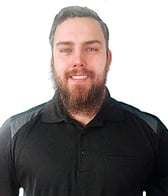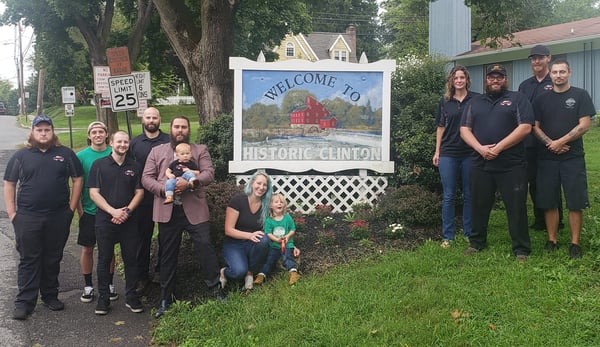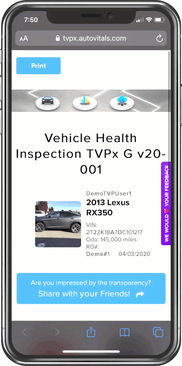The Digital Shop® Blog
COVID Changes Reap Rewards
During normal times, the numbers Russ Crosby is producing at his auto repair shop, Russ’s Wrench in Clinton, New Jersey, would be impressive. In the last six months, he has doubled his motorist research time, increased his ARO from $600 to $800, and increased his revenue per service writer by more than 100% -- but he has done all this in the midst of COVID-19.

Changes required
They say necessity is the mother of invention, and for Russ and his crew, COVID has required them to think outside the box. One of the most radical things they initiated; having their service advisor (SA), marketing manager, and jack-of-all-trades, Becky, work remotely.
“At the beginning of COVID, we were faced with the same challenges that many people were,” Russ shared. “There was a lot of fear in the team members and our customers about how are we going to get through this?”
Russ relies heavily on all of his staff, and while some aspects of shop-life were bound to stay the same during COVID, that wasn’t an option for Becky. She has a son with asthma who was home from school, and she couldn’t take risks. She sent her son to South Carolina to be with her parents for a bit, but it wasn’t a permanent solution, so Russ came up with another idea.
.png?width=300&name=Untitled%20design%20(37).png) “Becky, since March, has been working remote as a service advisor and marketing manager, and it’s been working really, really well,” Russ said.
“Becky, since March, has been working remote as a service advisor and marketing manager, and it’s been working really, really well,” Russ said.
She spends her time selling the jobs, talking to customers, and focusing on marketing to new customers or reaching out to older customers. The same tasks she was completing while standing behind the service counter she can now do from any location.
There were some growing pains, but Russ was pleasantly surprised at how minor they were.
- The crew had to learn how to work with Becky remotely.
“It really forces them to use the chat button and do the things that we preach,” Russ told Tom. “They don’t have that physical person anymore, so they have to keep you updated on what’s going on.” - Different network setups required the help of an IT person to make some adjustments.
Russ suggests all digital shops should have a relationship with an IT person; that way, everyone knows who to call if there is a problem.
“You may run into a couple little things like that, little roadblocks, but you just gotta work through them and have the right people around you,” he said. “We should, probably, in this business, have a decent IT guy or IT lady already, but if you don’t, I would get back out there and get one.”
At Russ’s Wrench, the transition to having Becky work remotely was eased by the culture they have created.

The staff at Russ's Wrench
“So there’s really two cons that I ran into, but we were able to work through them because we believe so much in our culture,” Russ said. “We have that team engagement that they’re willing to give something a try. It’s either let’s give this a try, or don’t work until you feel comfortable to come back to work, so I think that’s kind of a no brainer. When the boss is saying, ‘Hey, look, it’s okay if it doesn’t work, it doesn’t work. We’re going to figure this out.’ So really, team member buy-in. It wasn’t much of an issue, but it’s exploring the unknown.”
The opportunities are endless
Implementing these changes at the repair shop has started a snowball effect for Russ. Not only does he have big dreams of opening one if not two more shops in the near future, but he is also trying to think ahead and take advantage of all the changes that are coming thanks to COVID changing the way we work and live.
Hiring is one thing he is thinking about.
“From talking to a lot of people in this industry and a lot of trade industries, our number one concern is always how do we find good people,” Russ said. “How do we get the right person behind the counter? How do we get the right technician?”
His success having Becky work remotely has suddenly opened a door he hasn’t used before.
“I can hire the best of the best from anywhere in the country,” Russ said. “We’re not limited to our specific area anymore. I can really find someone that, maybe the automotive industry wasn’t their background, but they’re really great at sales, know how to relate to people, but they’re in Wyoming. I’ve taken out the issue of them being able to come and work here. They don’t have to move off to do anything, but I’m able to recruit from much further away and really expand the pool.”
Another concept Russ and his crew are exploring is the idea to have car drop-off locations located in dense areas where people can drop off their cars to be serviced. In this new world of Zoom and working from home, Russ acknowledges that people's routines have changed.
“As an automotive industry, we need to be more convenient because those people that used to go to that office building to drop their cars off during the day while they were at work, they may not be doing that anymore,” he said.
Listener questions
Auto repair shop owners and crew had a lot of questions for Russ during the episode. Here are a few:
- How do you keep your remote worker engaged? Do they lose contact with the people that are still in the shop?
“I think that’s really where your team meetings on a weekly basis or bi-weekly basis come in,” Russ said. “You know, all the white-collar industries have been doing this for a little while. They were all forced to go home and work from home. Your advisors and your production management team don’t need to be [at the shop], they don’t have a toolbox at the shop, we’re just used to them being there, so why wouldn’t it work?” - How do you handle waiting appointments?
“You still have people [working] in your building,” Russ said. “Right now with COVID, we’re not really letting anybody in our building, so although they may want to have a waiting appointment, we have a seating area outside, or we really focus on our pick up and drop-off system so they’re not in the building and they’re scheduled. We don’t really have a lot of waiters anymore because we’re making it as convenient as possible for them not to be here, whether it be with loaner cars or pick up and drop-off services.” - Are your vendors going paperless? How are you dealing with vendors and parts delivery?
“Getting [vendors] to buy into a paperless system could be a little tough because typically when you’re working with big corporations like that, it’s tough for them to make a change,” he said. “We’re putting a shop foreman in place so that foreman is now enabling some of that paperwork and scans it over to the appropriate person. We can order parts online, and we’re running Protractor, so it’s stamping invoice numbers. We know where all that stuff is, the invoice is just kind of a secondary thing that we have in case we need it.”  Does your remote advisor build the estimate, send out the digital vehicle reports to the customer, and then follow up with a phone call to discuss their options all from home? If so, how many vehicles does she typically handle in a day? More importantly, what are her average sales for a week?
Does your remote advisor build the estimate, send out the digital vehicle reports to the customer, and then follow up with a phone call to discuss their options all from home? If so, how many vehicles does she typically handle in a day? More importantly, what are her average sales for a week?
“Our advisor isn’t building estimates,” Russ said. “We have a production director building those estimates and then sending the inspection off to our advisor to look over, and then she is sending it out along with estimates when she’s contacting the customer. She’s not building the estimates. That way, she’s able to field phone calls from my production team and let them do their thing, and then she’s really just focusing on selling work. When she isn’t selling work or scheduling jobs, she’s working on our marketing end, or she also takes care of our HR backdrop. She’s got a couple other things on our plate, but you know, I took the estimating away from her and gave it to our production team because it just seemed to flow better, and when she was in the shop, that’s basically how it worked. We have Alex developing and creating most of the estimates and then pass it over to Becky to sell the work, so the only difference now is she’s not in the building.”- Are there any issues that come up when your advisor is on the phone with a customer and gets questioned about suggested repair(s) or services needed since she didn’t build the estimate?
“We haven’t had that question asked a single time,” Russ said. “The reason is because Becky takes the appointments and she’s setting up the job and talking with the customer initially. Then she’s the one calling back and saying, ‘Hey, this is what you need for your vehicle,’ so the customer doesn’t necessarily know that somebody else is building the estimate. Now, if they did ask her, the answer would be pretty easy. It would be, ‘No, I didn’t put together your estimate. I am in touch with the technician, and I do see what our production director has done. This is his expertise, finding you quality parts for the right price and putting it together so that I can deliver that to you.’” - As the owner, I am the quality control guy and do every final road test. Do you have someone separate to do that? I worry about going remote with my sales if I’m not there to do the quality control.
“I’m super, super proud of a system that we kind of put into place,” Russ shared. “I gave [one of my guys] a specific quality control list, and I’m adding it to the AutoVitals inspection so that he can go through and do a quality control test at the end of the jobs. The technicians would forward it to ‘waiting for quality control,’ and this guy can see him up there with the keys hanging and he goes through and does a quality control and then it is the last person with the keys before it’s submitted to ‘waiting for pick up.’ We’re already doing that in a paper form, and we’ve been doing it for about two weeks, and I’ve got to tell you, it’s working beautifully. My suggestion to you would be, pick another person in the shop. Imagine if you were sick that day, who would do that quality control. Pick another person or two. We have two people that do this, so if one guy is out, the other person steps in and takes care of the quality control. That way, we’re not missing anything. Wheel lugs are put back, lock keys are put back, there are no smudges on the paint. Making sure our oil change stickers are in there and not some other company. Doing those things really makes a difference, and I think by adding it to the inspection and sending it out to the customer when they close out, they’ll see that we went above and beyond with the quality control check at the end.” - Are you using Zoom right now?
“We started using Zoom to discuss with our customers, we don’t want to lose that personal touch,” Russ said. “For us, we still want to get that personal interaction, so even the writers in the shop can bring up a Zoom call and have that face to face interaction while they go through the reports.”
Want to hear more from Russ?
- Russ and his lead tech stop by in episode 56 to chat about how to get tech buy-in at digital shops. Listen here
- Learn how to find and build a successful SA in episode 30
- During COVID, keeping your (and your customers’) needs and motivations at the forefront has been especially important, hear how Russ has been doing just that in episode 61
- Want to learn how to network using the digital shop? Check out Russ in episode 44
- Russ chats with Tom and a few others in the Digital Shop Conference 2020 preview episode 32
- Learn how to break down goals into manageable steps in this episode of The Digital Shop Talk Radio
How to contact Russ and Russ’s Wrench:
Read On
Efficiency = More Revenue in 3 Steps
When you are running an auto repair shop, every minute counts. Yet, some shops are still losing...How to Manage an Increased Car Count in Your Auto Repair Shop
As the cost of cars increases, car owners are prioritizing and investing in vehicle longevity. This...Oil Change Stickers vs. Service Reminders
For many auto repair shops, the printed oil change sticker has been a reliable tool for decades,...Posts by Topic
- Digital Shop (47)
- auto repair shop (44)
- automotive shop management software (31)
- Auto Shop (29)
- Autovitals (29)
- DVI (29)
- shop management (25)
- workflow (18)
- Digital Marketing (17)
- BCP (16)
- CRM (15)
- auto repair shop marketing (15)
- Staff Buy-In (14)
- Best Practice (13)
- aro (13)
- Consistency (11)
- Digital Vehicle Inspection (11)
- Process Change (11)
- Tech (11)
- service advisor (11)
- COVID-19 (10)
- KPIs (10)
- Shop Culture (10)
- Websites (10)
- AutoVitals News (8)
- Integration (8)
- Website (8)
- automotive shop software (8)
- Announcement (7)
- Automotive Technician (7)
- Press Release (7)
- Partners (6)
- auto repair marketing company (6)
- auto repair shop SEO (6)
- New Features (5)
- auto repair services (5)
- best auto repair software (5)
- Coaching (4)
- Customer Reviews (4)
- Paperless (4)
- Reviews (4)
- auto shop management (4)
- multishop (4)
- smartflow (4)
- Automotive Technician Shortage (3)
- DRIVE Shops (3)
- Digital Shop Conference (3)
- Industry Events (3)
- Meineke (3)
- NAPA (3)
- Shop-Ware (3)
- auto parts inventory (3)
- auto shop efficiency (3)
- automotive repair invoice app (3)
- creative (3)
- drop off (3)
- training (3)
- web based auto repair software (3)
- Automotive text messaging (2)
- Bookkeeping for auto repair shops (2)
- Case Study (2)
- POS (2)
- Picture Edits (2)
- Protractor (2)
- Recruiting (2)
- RepairPal (2)
- TeE-Times (2)
- The Digital Shop Talk Radio (2)
- inventory management (2)
- loyalty (2)
- Auto mechanic interview questions (1)
- BayIQ (1)
- Building a Bench (1)
- Campaign Manager (1)
- Canned Jobs (1)
- Community (1)
- GMB (1)
- Guided Inspection (1)
- Hiring (1)
- Interview (1)
- MRT (1)
- Motorist Approval (1)
- Q&A (1)
- Remote Work (1)
- Service Writer (1)
- TVP (1)
- Tekmetric (1)
- The Digital Shop Summit (1)
- Who's in our shop? (1)
- auto parts (1)
- auto repair shop financing (1)
- best auto repair shop websites (1)
- estimate (1)
- financing (1)
- inflation (1)
- marketing plan (1)
- parts catalog (1)
- pricing (1)
- retention (1)
- script (1)
- social media (1)
- social media marketing (1)



.png?width=231&name=Untitled%20design%20(39).png)
